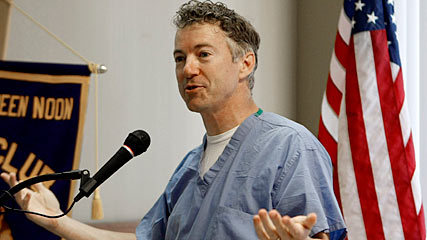Rand Paul has been a lot of things over the last 5 years: a Senator, a Tea Party scion, and now a candidate for the Republican nomination for president.
But throughout all of these things Paul, has always fallen back to his years as an Opthamologist and highlighting the training the dedication, even the volunteer service he's done have all been a part of his political message making. But what if Paul wanted to bring his same level of libertarian politics to doctors? What if his same brand of no government, no-oversight-free-market-politics made its way into your day to day healthcare needs? Apparently, Paul has been privately pushing for that all along under the guise of the Association of American Physicians and Surgeons (AAPS).
The name sounds innocuous enough. But the AAPS has a radical political agenda that would likely gut even the most basic protections Americans hold dear in the realm of healthcare. The group has published numerous troubling articles drawing a connection between vaccinations and autism, abortions and breast cancer, and even connecting the rise in American leprosy cases to illegal immigration. While these are all fringe beliefs based on nothing more than junk science, they actually don't constitute the most dangerous policy goals of the organization. Recently, they've set their sights on medical certification boards.
For those who may be unclear on the role of medical certification boards, these are the organizations that set the standards for certification that all doctors have to be a specialist in that area of medicine. When a doctor says they're Board Certified, it's because they've gone through this process.
"The medical recertification industry is a monopoly whose net keeps widening" and "opponents of MOC [Maintenance of Certification] urge physicians to 'stand up to the tyranny' of the American Board of Medical Specialties and the MOC requirements of the specialty boards. 'I call it 'civil disobedience' and regard myself as part of an incipient mass-noncompliance movement," says Dr. Weiss, who has decided not to recertify.
AAPS has decided that the idea of doctors having to periodically retrain and update their skills in the medical profession is a horrible imposition of government authority and, thus, must be stopped. They argue that unlike cops, or teachers or even truck drivers, doctors should somehow be exempt from maintaining their skill set. The consequences of this change in legislation would be disastrous -- and not just for patients, but for doctors themselves.
The vast majority of Americans don't see a medical provider every year, and when they do, it is likely for emergencies, because their children are sick, or they visit their local pharmacist. If doctors are left to their own whim to determine when and how they update and certify their skills, changes in medication, surgery procedures and patient care will likely be missed or just outright ignored. Not because doctors are lazy or unprofessional, but because re-certification takes time, money and study.
Most doctors feel equipped to handle whatever comes into their offices. However, certification doesn't just affect patients, it protects doctors as well. Proof of certification and updated medical knowledge inoculates doctors against lawsuits and challenges about their competence. If an urologist is sued for malpractice two weeks after being re-certified they have a much stronger defense than if the last time they proved their ability was medical school in the 90's.
Senator Rand Paul was a part of the AAPS until 2010 when he was elected to the Senate, like most politicians he chose to quietly separate himself from organizations that might harm his future political goals (like the Palin's and the Alaska Independence Party). But it doesn't mean he still doesn't share these beliefs and, in fact, given Paul's recent statements about autism and vaccination there is every reason to believe that he is still an ideological member of the AAPS even if he's no longer officially carrying water for them.
Rand Paul may be many things -- a crusader, a protector of privacy and a conservative, but one thing he certainly isn't is informed on the value of and importance of oversight in American healthcare. Medical review boards are a necessity for a safe and transparent healthcare system in the United States. The AAPS and organizations like it, are attempting to scuttle the ways in which the consumer is protected in favor of empowering doctors who, regardless of intentions, are still capable to of making life threatening mistakes. Libertarian politics may work great if you're running for president, but it doesn't take an eye doctor to see it won't work well for the healthcare needs of Americans.
